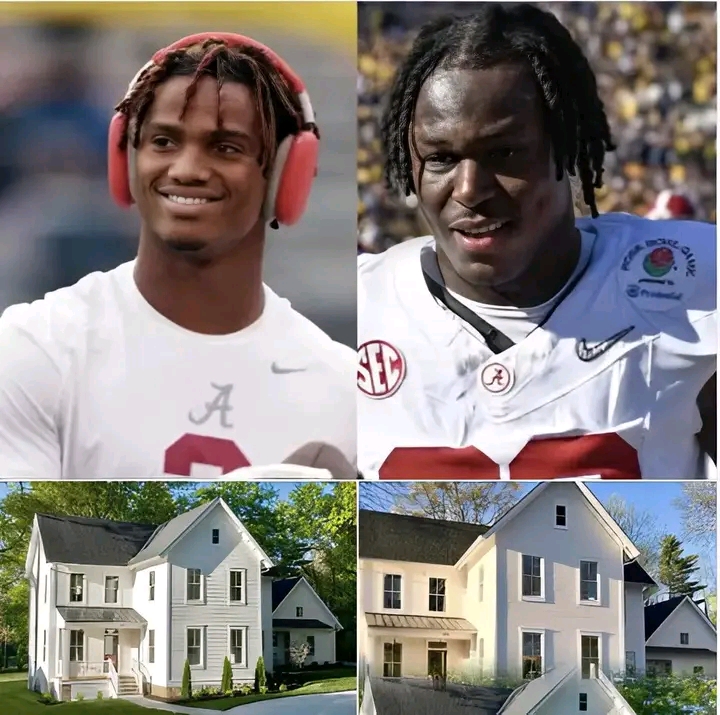Heart Over Hype: Alabama Stars Deontae Lawson and Ryan Williams Lead Historic $7.8M Player-Driven Initiative to Shelter and Empower Tuscaloosa’s Elderly Homeless
In an era where college athletes are often defined by on-field performances and NIL valuations, two University of Alabama football standouts—linebacker Deontae Lawson and freshman phenom Ryan Williams—are redefining what it means to be a student-athlete. In a groundbreaking move announced on Wednesday, Lawson and Williams revealed they are leading a $7.8 million player-driven investment to build a dedicated housing and wellness complex for Tuscaloosa’s elderly homeless population.
The initiative, dubbed “The Crimson Haven Project,” is the first of its kind in NCAA history, not only for its scale but also because it is fully funded by active college athletes and supported by their NIL earnings, endorsements, and donations from fellow teammates and former Alabama players in the NFL.
A Mission Born of Empathy
Speaking at a press conference on campus, Lawson explained how a personal encounter with a homeless man outside Bryant-Denny Stadium last winter sparked the idea.
“He told me he was a Korean War veteran, sleeping behind a dumpster with nowhere to go and no family left. It stuck with me,” said Lawson, visibly emotional. “I realized we’ve been blessed with a platform and resources—what good are they if we can’t use them to change someone’s life?”
Freshman wide receiver Ryan Williams, who has quickly become one of the most recognizable names in college football, said he was immediately on board.
“This isn’t charity—it’s responsibility,” said Williams. “These are our neighbors, our elders, our community. We wanted to create something permanent, dignified, and safe for them.”
Crimson Haven: More Than Just a Shelter
The project will involve the construction of a 50-unit complex located just outside downtown Tuscaloosa. Crimson Haven will offer not only housing but also a community center equipped with health care services, addiction recovery programs, counseling, meal services, and job training opportunities. The aim, the players say, is not just to shelter, but to restore dignity and independence to an often-overlooked population.
Construction is scheduled to begin this summer, with the first residents expected to move in by spring 2026.
Backed by a Brotherhood
Within days of announcing the project privately to their teammates, over two dozen Alabama football players pledged portions of their NIL income toward the cause. Former Crimson Tide stars including Jalen Hurts, DeVonta Smith, and Derrick Henry are also reported to have contributed.
Alabama head coach Kalen DeBoer praised the players’ leadership:
“What Deontae and Ryan are doing goes beyond football. This is legacy work. They are the embodiment of what we want Alabama athletes to stand for—character, service, and heart.”
A Call to Action
Lawson and Williams hope their actions inspire athletes across the country to rethink how they use their influence and earnings.
“If you’re making six or seven figures in college and you don’t look out for those suffering in your own backyard,” Williams said, “you’re missing the bigger picture.”
The university has pledged administrative support to fast-track zoning and permits, and local nonprofit partners such as the Tuscaloosa Housing Initiative and Meals on Wheels have signed on as long-term collaborators.
A New Era in College Athlete Activism?
With NIL earnings transforming the financial lives of student-athletes, experts say this project could mark a turning point in how college athletes engage with social issues.
“This could be the start of something seismic,” said Dr. Lisa Carmichael, professor of sports sociology at the University of Alabama. “It’s activism rooted not in protest, but in construction—literally building solutions. That’s revolutionary.”
Final Thoughts
As Lawson and Williams closed the press event, they were asked if they were worried about distractions affecting their upcoming season. Lawson’s reply drew a standing ovation:
“The real distraction is knowing people are dying outside while we live in comfort. Helping them—that’s focus.”
For Tuscaloosa, for Alabama, and for college sports as a whole, The Crimson Haven Project may be remembered as more than a charitable endeavor—it could be the start of a new playbook for impact and legacy.





























